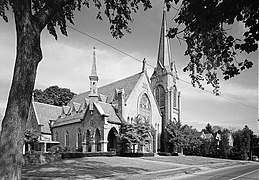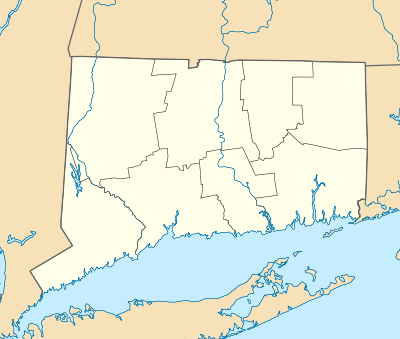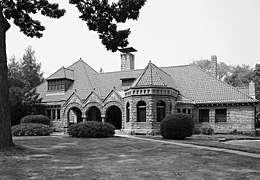Southport Historic District (Fairfield, Connecticut)
The Southport Historic District in the town of Fairfield, Connecticut is a 225-acre (91 ha) area historic district that was listed on the National Register of Historic Places in 1971. It preserves a portion of the modern neighborhood and former borough of Southport, Connecticut. Since the British burnt almost all of Southport's structures in 1779, there is only one home built prior to that date, the Meeker House at 824 Harbor Road, which survives.
Southport Historic District | |
 Southport Congregational Church, 1966 | |
  | |
| Location | Roughly bounded by Southport Harbor, RR, Old South Rd. and Rose Hill Rd., Fairfield, Connecticut |
|---|---|
| Coordinates | 41°7′55″N 73°17′4″W |
| Area | 225 acres (91 ha) |
| Built | 1800 |
| Architectural style | Greek Revival, Romanesque, Federal |
| NRHP reference No. | 71000898[1] |
| Added to NRHP | March 24, 1971 |
Description
The area of the district is bounded on the north by the Metro-North railroad tracks, on the south by the Mill River and Southport Harbor, on the west by Old South Road, and on the east by Rose Hill Road. It includes additional properties on both sides of Old South Road and Rose Hill Road, but excludes the commercial and industrial properties along Pequot Avenue inside the so-defined area.[2]:3 This is about a quarter of the former borough area of Southport, which ran from Mill River to Sasco Creek, and from the Southport Harbor to Mill Hill.[2]
A local commission enforces preservation rules in the district (and also in two other historic districts in the town of Fairfield). Alterations to properties in the district have to be approved. A case where a Greek Revival mansion owner placed a large sculpture on the grounds went all the way to the U.S. supreme court in 2007. The Supreme Court ruled in favor of the commission, that the sculpture qualified as a structure and required commission approval.[3] It was the Historic District Commission of Fairfield. More here.[4] The 80 foot, six ton sculpture by German artist Anselm Kiefer, titled "Narrow as the Vessels", was donated to a museum, and the owner put even more striking (although lighter) sculptures on the lawn instead.[5][6]
In 1970, the NRHP nomination for the district argued it was "significant because it has been the center of trade and commerce in Fairfield and because its history is typical of the development of commercial life in many New England ports in the fifty years following the revolutionary war. The architecture of the district consists primarily of buildings constructed after 1779 when the British virtually destroyed Fairfield. It is a valuable concentration of Greek Revival and Victorian structures which were for the most part the homes of substantial men whose wealth came from their involvement in commerce, banking, and shipping."[2]:11
It includes more than 150 contributing buildings. The more significant ones include:
- 750 Harbour Road, the house of Oliver Perry, a significant figure (but not the more famous Oliver Hazard Perry), a Greek Revival house with a pediment above four Doric columns;
- 780 Harbor Road, house of Walter Perry III, a Federal style house built in 1830
- 712 Harbor Road, a Greek Revival house with Corinthian columns
- 478 Harbor Road, built in 1831
- 72 Willow Street, childhood home of Joseph Sheffield, founder of the Rock Island Railroad
- 104 Old South Road, home of Paschal Sheffield, a privateer for Argentina during its war for independence from Spain
- 824 Harbor Road, Meeker House, built prior to 1766, only structure that is known to have survived the British burning of Southport in 1779
- 25 Westway Road, built in 1856, has gingerbread trim
- 95 Westway Road, built in 1840
- 564 Harbor Road, built in 1835 by a shipowner and captain, Charles C. Perry, built in a Greek Revival style which was later altered but then restored in 1926
- "The Bulkeley Houses", at 14 Willow Street, 104 Main Street, 142 Main Street, 114 Westway Road, 892 Harbor Road
- 187 Westway Road, built as a saltbox for Dimon prior to 1818, since enlarged and altered. It has the "Dimon Oak", known to be at least 260 years old in 1970, which stood nearly 100 feet tall and measured 19.5 feet in circumference
- 95 Main Street, built c. 1827, which served as a school, a place of worship, and as a town hall. The building, now a residence, at some point after 1854 was moved closer to Main Street and was altered.
- 450 Harbor Road
- the "Nichols Houses", at 155 Rose Hill Road, 494 Harbor Road, 534 Harbor Road
- three Victorian era houses at 658 Pequot Road, 418 Harbor Road, 385 Harbor Road
- 798 Harbor Road, now a house, the main part of which was a store in the 1850s. In 1894 it was the "Bachelor's Comfort, and Married Men's Relief" club, during World War I it was a British War Relief something, and later it was the first clubhouse for the Pequot Yacht Club.
- Tide Mill Building, at 95 Harbor Road
- 668-670 Harbor Road
- 62 Center Street, a Greek Revival house

- Pequot Library, at 720 Pequot Avenue
Harbor Road
Harbor Road runs along the harbor and all of it is included in the district
.jpg) Captain Ward Bulkley House, 298 Harbor Road
Captain Ward Bulkley House, 298 Harbor Road.jpg) Zalmon Wakeman House, 418 Harbor Road
Zalmon Wakeman House, 418 Harbor Road%2C_Southport_(Fairfield_County%2C_Connecticut).jpg) Captain William Webb House, 478 Harbor Road
Captain William Webb House, 478 Harbor Road.jpg) Allen Nichols House, 494 Harbor Road
Allen Nichols House, 494 Harbor Road.jpg) Barnabas Sturges House, 534 Harbor Road
Barnabas Sturges House, 534 Harbor Road.jpg) Charles Perry House, 564 Harbor Road
Charles Perry House, 564 Harbor Road.jpg) Henry Sturges House, 608 Harbor Road
Henry Sturges House, 608 Harbor Road.jpg) Wakeman Memorial, 648 Harbor Road
Wakeman Memorial, 648 Harbor Road.jpg) Austin Perry House, 712 Harbor Road
Austin Perry House, 712 Harbor Road.jpg) Oliver H. Perry House, 750 Harbor Road
Oliver H. Perry House, 750 Harbor Road.jpg) Gurdon Perry House, 780 Harbor Road
Gurdon Perry House, 780 Harbor Road.jpg) William Bulkley House, 824 Harbor Road
William Bulkley House, 824 Harbor Road
Pequot Road
Part of Pequot Road is included in the district. Newer, commercial parts are not.
.jpg) C. O. Jelliff Company, 354 Pequot Road
C. O. Jelliff Company, 354 Pequot Road%2C_651_Pequot_Road%2C_Southport_(Fairfield_County%2C_Connecticut).jpg) Trinity Church (P. E.), 651 Pequot Road
Trinity Church (P. E.), 651 Pequot Road%2C_651_Pequot_Road_(Southport%2C_Fairfield_County%2C_Connecticut).jpg) Trinity Parish Chapel, 651 Pequot Road
Trinity Parish Chapel, 651 Pequot Road.jpg) Benjamin Pomeroy Carriage House
Benjamin Pomeroy Carriage House.jpg) Benjamin Pomeroy House
Benjamin Pomeroy House.jpg) Francis D. Perry House, 678 Pequot Road
Francis D. Perry House, 678 Pequot Road.jpg) Oliver T. Sherwood House, 683 Pequot Road
Oliver T. Sherwood House, 683 Pequot Road
Gallery: Other
%2C_Southport_(Fairfield_County%2C_Conncecticut).jpg) 46 Station Street
46 Station Street.jpg) Connecticut Bank, Mill River Branch, 227 Main Street
Connecticut Bank, Mill River Branch, 227 Main Street.jpg) Francis Jelliff House, 212 Center Street
Francis Jelliff House, 212 Center Street.jpg) Henry Perry House, 45 Westway Road
Henry Perry House, 45 Westway Road.jpg) John Hoyt Perry House, 134 Center Street
John Hoyt Perry House, 134 Center Street.jpg) Julius Pike House, 62 Center Street
Julius Pike House, 62 Center Street.jpg) Moses Bulkley House, 176 Main Street
Moses Bulkley House, 176 Main Street.jpg) Nehemiah Jennings Block, 668-70 Main Street
Nehemiah Jennings Block, 668-70 Main Street.jpg) New York, New Haven & Hartford Railroad Freight House
New York, New Haven & Hartford Railroad Freight House.jpg) New York, New Haven & Hartford Railroad Station
New York, New Haven & Hartford Railroad Station.jpg) Paschal Sheffield House, 104 Old South Road
Paschal Sheffield House, 104 Old South Road.jpg) Pequot School, 214 Main Street
Pequot School, 214 Main Street.jpg) Simon C. Sherwood House, 67 Westway Road
Simon C. Sherwood House, 67 Westway Road Southport Congregati...
Southport Congregati....jpg) Southport Harbor, Mill River
Southport Harbor, Mill River.jpg) Southport Savings Bank, 226 Main Street
Southport Savings Bank, 226 Main Street.jpg) Wakeman B. Meeker House, 25 Westway Road
Wakeman B. Meeker House, 25 Westway Road.jpg) Waugh House, 249 Old South Road
Waugh House, 249 Old South Road
See also
- Greenfield Hill Historic District, 1 of 2 other historic districts in Fairfield covered by the same commission
- Fairfield Historic District (Fairfield, Connecticut), 2 of 2 other historic districts
- National Register of Historic Places listings in Fairfield County, Connecticut
References
- "National Register Information System". National Register of Historic Places. National Park Service. March 13, 2009.
- Constance Luyster (September 23, 1970). "National Register of Historic Places Inventory-Nomination: Southport Historic District / Mill River". National Park Service. and Accompanying 13 photos, from 1970
- Hughes, C. J. (June 14, 2009). "Living In: Southport, Connecticut -- An Enclave for One's Inner Scarlett". New York Times. Retrieved May 23, 2010.
- David Segal (August 1, 2009). "$100 Million Payday Poses Problem for Pay Czar". The New York Times.
- Andrew Brophy (October 2, 2007). "Halls put new sculptures in front yard". Connecticut Post, Bridgeport.
- "Historic District Commission of the Town of Fairfield v. Andrew J. Hall et al" (PDF). Connecticut State Supreme Court decision SC 17658. June 12, 2007.
External links
| Wikimedia Commons has media related to Southport Historic District (Fairfield, Connecticut). |
- Map showing approximate bounds of Southport Historic District (but not exclusion of Pequot Avenue commercial and industrial properties)
- The Southport Picture File (a collection of 800 historical photos compiled by historian V. Louise Higgins. Housed at Pequot Library and accessible online.)
- Living in Southport, Conn. (New York Times photo collection)
- Brilvitch, Charles. 1977. Walking Through History. The Seaports of Black Rock and Southport. Fairfield Historical Society.